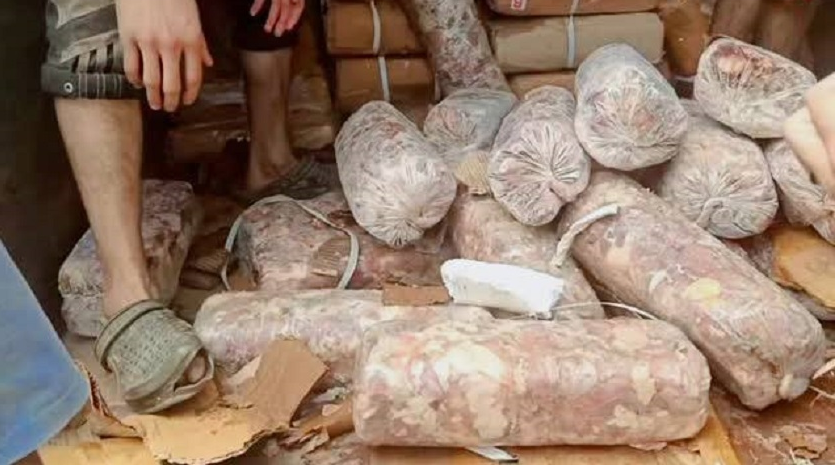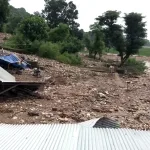Amid an intensified crackdown on the sale of rotten and adulterated meat in Kashmir, health experts have raised the alarm over widespread risks of contamination in the region’s meat supply chain. Doctors are urging the public to opt for fresh over frozen products, warning that lax regulation and poor hygiene standards are putting public health in jeopardy.
The warning comes as hospitals report a surge in food poisoning cases, believed to be linked to unsafe meat and poultry products sold in local markets and restaurants.
Doctors have urged the public to prefer fresh over frozen products and called for strict enforcement of regulations to control the unchecked growth of unregulated meat and poultry shops. The warning comes as hospitals report food poisoning cases.
Dr.Masood Rashid, a Critical Care Expert with the J&K Health Department, emphasised the importance of consuming fresh meat and chicken, stating that frozen and improperly stored items pose significant health hazards.
“Whether it’s meat or chicken, it should ideally be consumed fresh. While deep-freezing or dressing can extend shelf life, the quality tends to degrade, and there’s a higher risk of contamination, especially when packaging is opened repeatedly. Since there’s no foolproof mechanism in place, contamination is likely,” he said.
Dr. Rashid also expressed concern over meat transported into Kashmir from outside the region. “How can we guarantee that it remains properly frozen? Roads are often closed, delaying supplies. It’s not safe, and people must opt for fresh meat instead,” he said.
He highlighted the lack of regulation in the meat industry, citing the mushrooming of unauthorized meat and poultry shops across Kashmir. “Proper slaughterhouses and stamping under official supervision are crucial. In the absence of regulation, even dead animals can be sold,” he warned.
Calling for greater accountability, Dr. Rashid said: “The Food Safety Department carries huge responsibility and must be proactive if they want to bring about change. If contaminated food is consumed, it can lead to serious food poisoning — a common and rising problem. Hospitals remain abuzz with such cases every day.”
Several people have also taken to social media to share their own experiences of falling sick after consuming contaminated food from local restaurants and cafés.
InshaQazi, an entrepreneur from Srinagar, shared a harrowing experience in a Facebook post, saying that a recent meal at a popular café in LalChowk turned into a “complete nightmare.”
“My entire family, including my pregnant cousin, fell violently ill with severe food poisoning after dining there. Within hours, we experienced vomiting, stomach cramps, and dizziness. I had to be put on IV fluids due to dehydration and weakness,” she wrote.
She stressed the gravity of the issue. “This is not just about bad service or taste. A pregnant woman falling sick from contaminated food is unacceptable. Restaurants have a basic responsibility to maintain hygiene — clearly, that was not the case here.”
The Food Safety Department has recently intensified its crackdown on dressed chicken and meat being sold in violation of the Food Safety and Standards Act across several parts of the Valley. The department remains on high alert as public complaints continue to pour in.
However, questions are being raised about the unchecked flow of frozen meat, dressed chicken, and fish into Kashmir despite existing regulations under the Food Safety and Standards Authority of India (FSSAI).
Mohammad Aslam, a senior citizen from Srinagar, said there is no quality control at entry points like Toll Post at Lower Munda. “This allows potentially unsafe meat to enter market unchecked, reaching vendors and restaurants and putting public health at risk,” he said.
On the other hand, authorities have failed to regulate street food vendors and mini-eateries, including those selling chicken, biryani, and momos, who continue to operate in highly unhygienic conditions across Srinagar and other districts.
In the absence of sanitation and checks, the sale of unhygienic organ meat is rampant. Cockroaches, flies, and bees are frequently seen hovering over exposed animal organs sold in the open, which are then consumed by unsuspecting customers.
Javid Ahmad, a resident of Rawalpora who had come to buy meat in Batamaloo, said the situation remains unchecked. “It’s common to see flies sitting on uncovered chicken and other food items sold on the roadside. Yet, the authorities remain silent,” he said.
Hilal Ahmad Mir, Assistant Commissioner of Food Safety, Kashmir said that all necessary protocols are being followed when meat and chicken are imported from outside Kashmir.
“When meat and chicken are transported under a proper temperature-controlled system and are properly labelled, there is no issue with their usage,” he said. “There are strict checks in place at Toll Post at Lower Munda for both frozen meat/chicken and live animals.”
He added that the crackdown on substandard and unhygienic meat continues across the Valley, with similar drives also being conducted in Jammu.
“We will continue these enforcement drives to ensure that such meat and chicken are neither sold in the markets nor used in restaurants and hotels,” he said.








